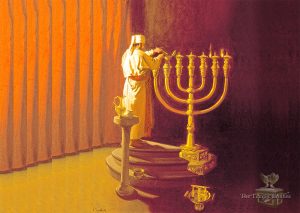Biha’aloscha – Being Aharon

Something special about Aharon HaCohein is telegraphed in the sentence “And Aharon did so,” after Moshe’s brother receives instructions about lighting the menorah in the Mishkan (Bamidbar 8:3). Rashi, paraphrasing Sifri, comments: “This tells us the praiseworthiness of Aharon, that he didn’t change [anything in the service].”
Well, of course he followed Divine orders carefully, puzzle many commentators. What is the significance of stating the obvious fact?
An interesting approach is offered by the Chasam Sofer. The Talmud, he points out, describes the daily schedule of service in the Mishkan and Beis HaMikdash and notes, inter alia, two things: that the menorah-lighting takes place simultaneously with the burning of the afternoon incense on the mizbei’ach haketores (Yoma 15a); and that the cohein bringing the ketores would become wealthy as a result of performing that service (Yoma 26a).
Thus, suggests the Chasam Sofer, Aharon’s “not changing” means that he never took a day off from the menorah-lighting, which he could have allowed someone else to do, to take advantage of the wealth-producing ketores-offering. In other words, he shunned material gain that was available to him.
A simpler approach is taken by R’ Simcha Bunim of Peshischa, who interprets Rashi’s comment as “And Aharon didn’t change himself.”
“Power tends to corrupt,” British historian Lord Acton famously wrote in 1887. That adage – as true about fame and privilege as it is about power – has been borne out by countless examples since and presently.
Aharon, however, despite the new exalted status he had received, born of the special mitzvah entrusted to him, remained… Aharon.
© 2024 Rabbi Avi Shafran
My most recent Ami Magazine column, “ANC R.I.P.?,” can be read here.


Recent Comments